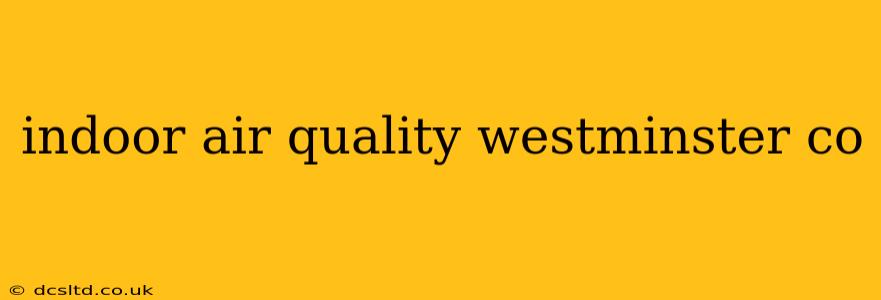Westminster, Colorado, boasts stunning mountain views and a vibrant community, but maintaining healthy indoor air quality (IAQ) is crucial for residents' well-being. Poor IAQ can lead to various health problems, impacting everything from allergies and asthma to more serious respiratory issues. This comprehensive guide explores the critical aspects of indoor air quality in Westminster, CO, helping you breathe easier in your home.
What Affects Indoor Air Quality in Westminster, CO?
Several factors contribute to the quality of air within Westminster homes. These include:
-
Altitude: Westminster's high altitude can impact humidity levels, potentially leading to drier air and increased susceptibility to respiratory issues. Dry air can also exacerbate allergies and worsen existing conditions.
-
Climate: Colorado's distinct seasons affect indoor air. During winter, heating systems can dry out the air, while summer months may bring in pollen and other outdoor allergens.
-
Construction Materials: The materials used in your home's construction can release volatile organic compounds (VOCs) into the air. Older homes may contain asbestos or lead paint, which pose significant health risks.
-
Household Products: Cleaning supplies, personal care products, and air fresheners often contain VOCs that can negatively impact IAQ.
-
Pets: Pet dander is a common allergen, significantly impacting indoor air quality for those with sensitivities.
How Can I Improve Indoor Air Quality in My Westminster Home?
Improving your home's IAQ involves a multi-pronged approach:
1. Regular Air Filter Changes:
This is one of the simplest and most effective steps. Regularly changing your HVAC system's air filters traps dust, pollen, pet dander, and other airborne particles, improving air circulation and reducing allergens. Check your filters monthly and replace them as needed, following the manufacturer's recommendations.
2. Proper Ventilation:
Adequate ventilation is essential for removing stale air and introducing fresh air. Open windows when possible, especially during milder weather. Consider installing an energy-recovery ventilator (ERV) or a heat-recovery ventilator (HRV) to improve ventilation without significant energy loss.
3. Control Humidity Levels:
Maintain optimal humidity levels in your home using a humidifier during dry months and a dehumidifier during humid periods. Ideal humidity levels generally range from 30% to 50%.
4. Minimize VOC Exposure:
Choose low-VOC or VOC-free cleaning products, paints, and other household items. Properly ventilate the areas where you're using these products to minimize indoor air contamination.
5. Regular Cleaning:
Regular cleaning is vital to remove dust, dirt, and allergens from surfaces. Vacuum frequently, paying attention to carpets and upholstered furniture. Dust and wipe surfaces regularly, and consider using a HEPA filter vacuum for better allergen removal.
6. Professional Indoor Air Quality Testing:
A professional indoor air quality test can identify specific pollutants or allergens present in your home. This allows for targeted solutions to address specific IAQ concerns. This is particularly helpful for those with existing respiratory conditions or allergies.
What are the Health Effects of Poor Indoor Air Quality?
Poor indoor air quality can significantly impact your health, leading to a wide range of problems:
-
Respiratory Issues: Asthma, allergies, and other respiratory illnesses can be exacerbated by poor IAQ. Increased exposure to pollutants can trigger coughing, wheezing, shortness of breath, and other respiratory symptoms.
-
Eye, Nose, and Throat Irritation: Exposure to irritants can cause eye, nose, and throat irritation. This is especially common with VOCs and other chemical pollutants.
-
Headaches and Dizziness: Poor IAQ can trigger headaches and dizziness in some individuals.
-
Fatigue and Cognitive Impairment: Exposure to pollutants can lead to fatigue, reduced cognitive function, and difficulty concentrating.
What are common indoor air pollutants in Westminster, CO?
Common indoor air pollutants in Westminster, CO, include:
-
Pollen: Depending on the season, pollen from various plants can be a significant contributor to poor IAQ.
-
Pet dander: Pet owners should take special care to manage pet dander levels, which is a common allergen.
-
Dust mites: These microscopic creatures live in carpets, bedding, and other fabrics, and their droppings can trigger allergic reactions.
-
Mold and mildew: Moisture build-up can lead to mold and mildew growth, which release spores that can cause respiratory problems.
-
Volatile organic compounds (VOCs): These are emitted from various household products and construction materials.
How can I prevent mold growth in my home?
Preventing mold growth involves controlling moisture levels. Ensure proper ventilation in bathrooms and kitchens, promptly repair any leaks or water damage, and address any sources of condensation. Regular cleaning and maintaining adequate humidity levels are also crucial.
This guide provides a starting point for understanding and improving indoor air quality in your Westminster, CO home. Remember, maintaining healthy IAQ is an ongoing process, and taking proactive steps will contribute significantly to your overall well-being.
